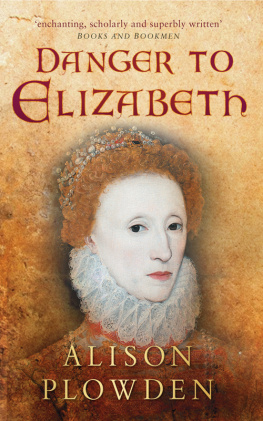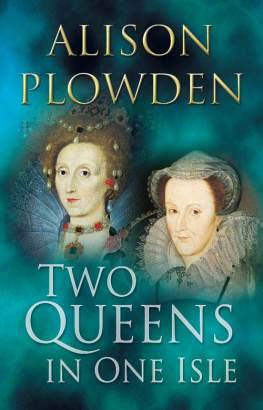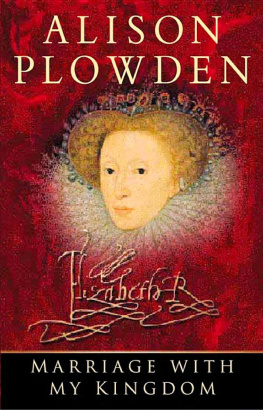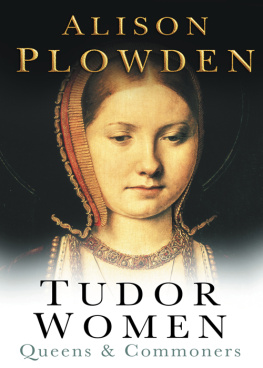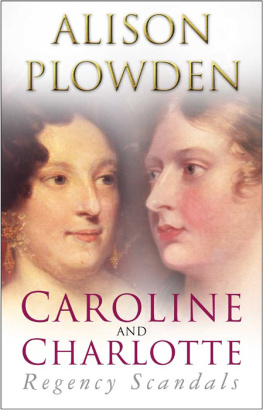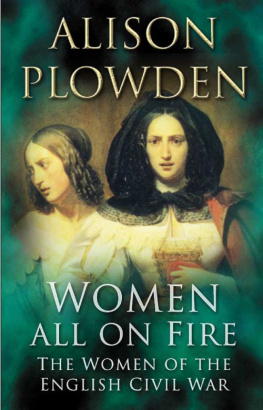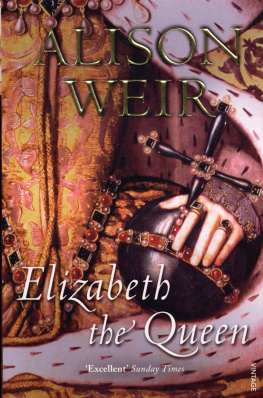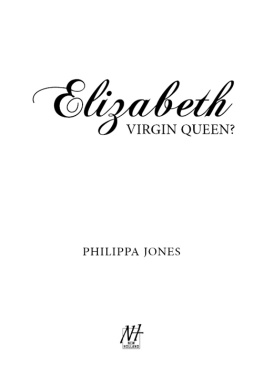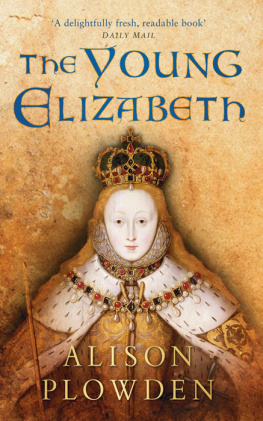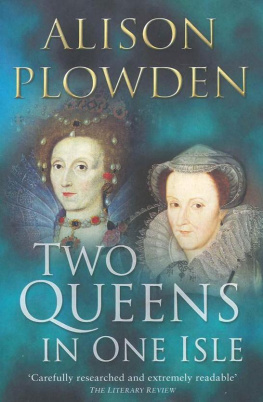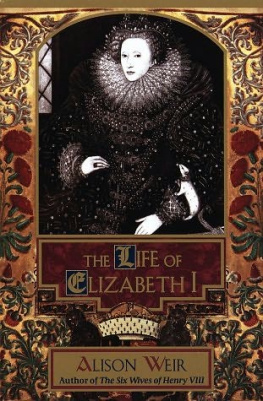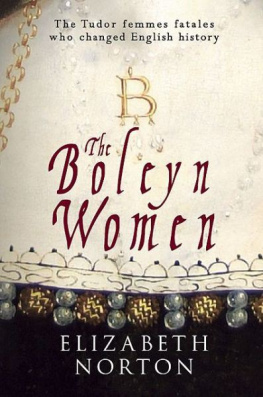About the Author
ALISON PLOWDEN was born in India and was formerly a script writer and editor for the BBC. Her television credits include Mistress of Hardwick, for which she won a Writers Guild Award. She is the author of many successful historical books including The House of Tudor, acclaimed by the great historian A.L. Rowse as Simply excellent on every count impossible to fault in scholarship or writing. This has recently been re-published by Sutton, where it joins others of her works, including Two Queens in One Isle: The Deadly Relationship of Elizabeth and Mary Queen of Scots, Tudor Women, The Stuart Princesses and Women all on Fire: The Women of the English Civil War. Alison Plowden lives near Wantage in Oxfordshire.
Praise for Alison Plowdens Elizabethan Quartet
The expert and scholar ought to give Miss Plowden the fullest marks for remarkable accuracy
Jasper Ridley
Glasgow Herald
a vastly interesting account
The Times
Miss Plowden brings to the whole period perceptive judgment and wide sympathy
Irish Times
it would be difficult to praise too highly Alison Plowden s Danger to Elizabeth her extraordinarily fine book
Church Times
Enchanting, scholarly and superbly written, warmly recommended
Charity Blackstock
Books and Bookmen
the sustained concentration on the subject and the balanced intellectual control of the elements involved make it the work of a scholar
Stephen Wade
Catholic Herald
Professors have something to learn from perceptive women in penetrating the very feminine psychology of Elizabeth I
A.L. Rowse
Sunday Telegraph
She writes with verve, brevity and often wit a most entertaining book which, at the same time, is accurate and judicious
Paul Johnson
Evening News
an absorbing portrait of possibly the greatest tease in history
Publishers Weekly, USA
a model of clarity
G.M.Wilson
Times Literary Supplement
For My Mother
With My Love
Contents
PROLOGUE
This lady and princess is a notable woman,
Francis Knollys, Carlisle, 11 June 1568
A T seven oclock in the evening of Sunday, 16 May 1568 house-wives in the lytle prety fyssher town of Workington, which lay near the mouth of the River Derwent on the coast of Cumberland, were indoors preparing supper; but those people still out and about enjoying the Sabbath air had been able to watch the progress of a small vessel edging into the harbour and tying up at the quayside. The unexpected visitor turned out to be a rough little craft of the type used for inshore fishing and carrying coals and lime across the Solway Firth, but the idlers on the waterfront could see at a glance that her passengers sixteen of them in all were neither colliers nor Galloway fishermen. Although tired and travel-stained, these were clearly people of consequence among them an unusually tall young woman, muffled in cloak and hood, who stumbled and fell as she came ashore.
The strangers sought shelter for the night at Workington Hall, their spokesman (he was John Maxwell, Lord Herries) giving out that he had carried off an heiress whom he was hoping to marry to the son of his old friend Sir Henry Curwen; but by the time darkness had fallen the whole neighbourhood was buzzing with the news that the tall young woman was none other than the already legendary Mary Queen of Scots, deposed and imprisoned by her ungrateful subjects and now fleeing for her life. Henry Curwen happened to be away from home but one of his servants, a Frenchman, had recognised the Queen as soon as she crossed the threshold and told a member of her entourage that he had formerly seen Her Majesty in better plight than now.
The reasoning which lay behind Marys rash decision to throw herself on the protection of her cousin, Elizabeth of England, remains obscure. It was a decision taken, as she herself later admitted, against the advice of her best friends. In the six and a half years which had passed since her return to her northern kingdom it was by no means the first time that the Queen of Scots had refused to listen to advice. Certainly the stubborn determination to go her own way was characteristic enough, as was her gamblers instinct to stake all on a single throw.
During her brief period of freedom it was just over a fortnight since she had escaped from Lochleven Castle with the assistance of Willy Douglas Mary had sent Elizabeth a full account of her predicament. Now she wrote again from Workington Hall on Monday, 17 May, ending with a moving plea for help: I entreat you to send for me as soon as possible, for I am in a pitiable condition, not only for a Queen but even for a gentlewoman, having nothing in the world but the clothes in which I escaped, riding sixty miles the first day and not daring to travel afterwards except by night, as I hope to be able to show you, if it please you to have compassion on my great misfortunes and permit me to come and bewail them to you.
Mary can scarcely have finished this letter before she was ceremoniously waited on by a deputation of local gentry, who conducted her a few miles inland to the town of Cockermouth. There Sir Richard Lowther, deputy governor of Carlisle, made his attendance upon her and it was agreed that she should spend that night in the house of a well-to-do merchant, one Master Henry Fletcher. When Mary told the Queen of England that she had nothing but the clothes she stood up in, she had, it seems, been speaking the literal truth. Richard Lowther noted that her graces attire is very mean, and as I can learn, hath not any better, neither other wherewith to change. Henry Fletcher is said to have presented his guest with thirteen ells of crimson velvet, and a black cloth gown was hastily made up for her on credit.
Anxious not to be outdone in matters of hospitality, Richard Lowther ordered her charges at Cockermouth to be defrayed, and himself provided horses to carry her and her train on the remainder of the journey to Carlisle. Lowther was not at all certain about the protocol governing the reception of refugee queens who had made their own realms too hot to hold them especially a queen who represented the sort of political dynamite that Mary Stuart did and he begged Sir William Cecil for instructions. Meanwhile, he intended to keep the fugitive safe at Carlisle Castle with such entertainment as he could provide on such sudden.
Mary had been considerably cheered by the kindness of her welcome. The warm-hearted (and predominantly Catholic) North Country folk were touched by her plight, besides being naturally curious to catch a glimpse of so romantic a figure as the Queen of Scots, and they came flocking in to Carlisle to pay their respects. Marys naturally buoyant spirits rose and, in a letter dated 20 May, she told the Earl of Cassilis that she expected to be back in Scotland at the head of an army, French if not English, by the middle of August.
By 20 May the news of her arrival had reached London. It cannot have been entirely unexpected. Queen Elizabeth had known for at least a week about her cousins escape from captivity and the possibility that Mary might be driven to cross the border must certainly have occurred to her. Elizabeth Tudor had in the past been given small reason to feel any personal affection for Mary Stuart but, as she had already made abundantly clear to the Scots, she held strong views on subjects who, whatever the provocation, forced their sovereign to abdicate, held her prisoner and threatened her very life. According to the French and Spanish ambassadors, Elizabeths first impulse had been to take Marys part and receive her at Court, but a majority on the Council quickly over-ruled their mistresss instinctive desire to show solidarity with the afflicted Queen of Scotland. Although these people are glad enough to have her in their hands, wrote the Spanish ambassador, they have many things to consider. If they keep her as in prison, it will probably scandalise all neighbouring princes, and if she remain free and able to communicate with her friends, great suspicions will be aroused. In any case, added Guzman de Silva with studied understatement, it is certain that two women will not agree very long.

